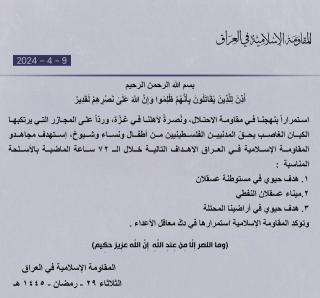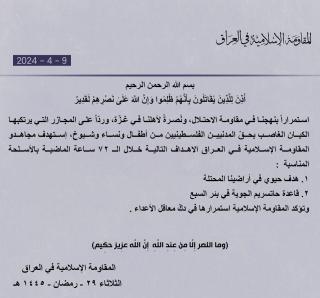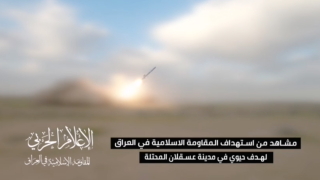
Islamic Resistance in Iraq and Sabereen Highlight Anti-Israel Cruise Missile Strikes

IRI is making up for its inability to strike U.S. sites by making louder claims of more sophisticated attacks on Israel, and Sabereen News seems freer to amplify these claims.
On April 9, the Islamic Resistance in Iraq (IRI), an umbrella group for Iran-backed militias, issued two statements claiming responsibility for five attacks on Israeli sites “in the past 72 hours.” The first statement included claims of attacks on three sets of targets: "a vital target in Ashkelon settlement; Ashkelon oil terminal; vital targets in our occupied lands [meaning Israel]" (Figure 1).
The second statement claimed attacks on two targets in Israel: "a vital target in our occupied lands; the Hatzerim Air Base in Beersheba" (Figure 2).
Soon after the statements were posted online, IRI's Telegram channel published a video purportedly showing al-Arqab cruise missiles launched at a “vital target in Ashkelon settlement,” “Ashkelon oil terminal," and “Hatzerim Air Base” (Figure 3). (According to the U.S. Defense Intelligence Agency, al-Arqabs are 351/Paveh-type cruise missiles that the Iran-backed Houthis in Yemen call the Quds.)
This was the first time IRI has claimed al-Arqab attacks since Abu Hussein al-Hamidawi, secretary-general of the leading militia Kataib Hezbollah (KH), announced the suspension of attacks against U.S. assets in late January. Yet there are some indications that this week's launches were conducted from southern or central Iraq (similar to the one photographed in Hillah in January).
By cutting across western Iraq and Jordan, the attacks may have bypassed some elements of Israel's early warning system; they also seemed to target more sensitive naval facilities. Israel is reacting accordingly: around the time of the attacks, the Israeli Navy announced that its C-Dome air defense system had “successfully intercepted a UAV that approached from the east and crossed into the area of the Gulf of Eilat,” the first time the system has achieved that feat.
As for Sabereen News, the prominent militia outlet had previously stopped posting IRI claims, angering the "Jihad Brothers Team" and other social media accounts affiliated with the militia Harakat Hezbollah al-Nujaba. Yet Sabereen has now resumed its coverage of IRI attacks, reposting videos of the new al-Arqab launches (Figure 4).
Even before Israel's lethal April 1 attack on Iranian military officers in Damascus, IRI had made Israel its sole target since halting attacks on U.S. forces weeks ago. Yet some muqawama (resistance) social media posts are now hinting at resumed strikes on U.S. bases. For example, in celebrating the latest Israel attacks, one Telegram account affiliated with Nujaba warned, "U.S. bases, remember this post well” (Figure 5).
In recent weeks, muqawama social media have mentioned a few attacks on U.S. bases in Syria, but there is no hard proof that these attacks occurred, and no group has claimed responsibility for them. For now, Militia Spotlight assesses that IRI remains focused on Israel and other non-U.S. targets (perhaps including trucks headed to Israel through Jordan).








